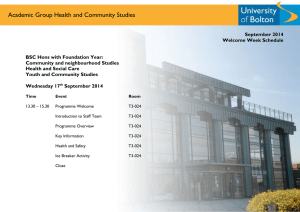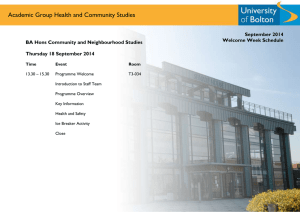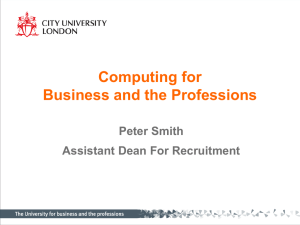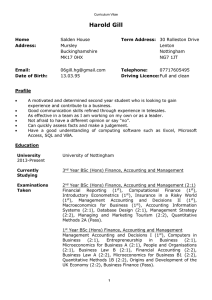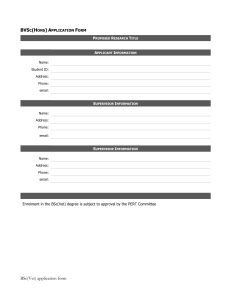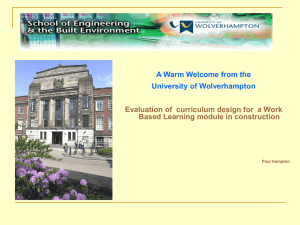Minutes of the 195th Meeting of Academic Council held at
advertisement
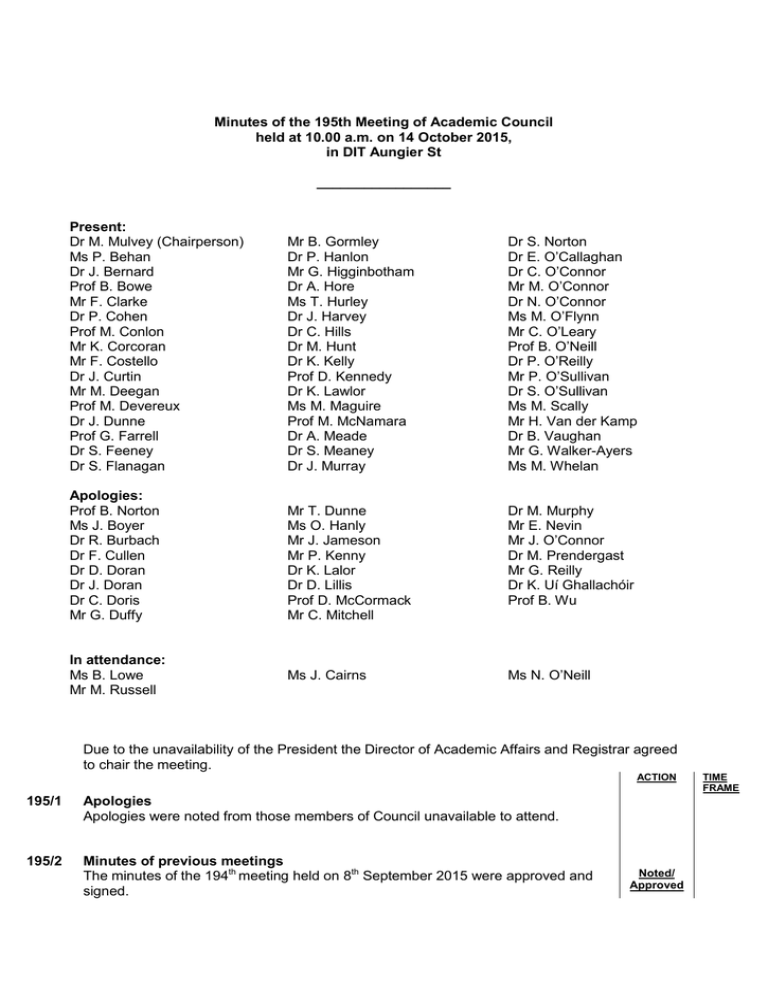
Minutes of the 195th Meeting of Academic Council held at 10.00 a.m. on 14 October 2015, in DIT Aungier St _________________ Present: Dr M. Mulvey (Chairperson) Ms P. Behan Dr J. Bernard Prof B. Bowe Mr F. Clarke Dr P. Cohen Prof M. Conlon Mr K. Corcoran Mr F. Costello Dr J. Curtin Mr M. Deegan Prof M. Devereux Dr J. Dunne Prof G. Farrell Dr S. Feeney Dr S. Flanagan Mr B. Gormley Dr P. Hanlon Mr G. Higginbotham Dr A. Hore Ms T. Hurley Dr J. Harvey Dr C. Hills Dr M. Hunt Dr K. Kelly Prof D. Kennedy Dr K. Lawlor Ms M. Maguire Prof M. McNamara Dr A. Meade Dr S. Meaney Dr J. Murray Dr S. Norton Dr E. O’Callaghan Dr C. O’Connor Mr M. O’Connor Dr N. O’Connor Ms M. O’Flynn Mr C. O’Leary Prof B. O’Neill Dr P. O’Reilly Mr P. O’Sullivan Dr S. O’Sullivan Ms M. Scally Mr H. Van der Kamp Dr B. Vaughan Mr G. Walker-Ayers Ms M. Whelan Apologies: Prof B. Norton Ms J. Boyer Dr R. Burbach Dr F. Cullen Dr D. Doran Dr J. Doran Dr C. Doris Mr G. Duffy Mr T. Dunne Ms O. Hanly Mr J. Jameson Mr P. Kenny Dr K. Lalor Dr D. Lillis Prof D. McCormack Mr C. Mitchell Dr M. Murphy Mr E. Nevin Mr J. O’Connor Dr M. Prendergast Mr G. Reilly Dr K. Uí Ghallachóir Prof B. Wu Ms J. Cairns Ms N. O’Neill In attendance: Ms B. Lowe Mr M. Russell Due to the unavailability of the President the Director of Academic Affairs and Registrar agreed to chair the meeting. ACTION 195/1 Apologies Apologies were noted from those members of Council unavailable to attend. 195/2 Minutes of previous meetings The minutes of the 194th meeting held on 8th September 2015 were approved and signed. Noted/ Approved TIME FRAME 195/3 Matters Arising (a) Minute 194/3(b) - Transition into Higher Education: Extending and Enhancing Best Practices Dr J. Harvey, Head of Learning & Teaching Technology Centre, stated that one response has been received in relation to the recommendations included in the above document and that responses from the remaining three Colleges are awaited. Dr Harvey agreed that she would provide an update at the next meeting. 195/4 Chairman’s Communications (a) Proposal in relation to the membership of Academic Council’s Library Committee Academic Council adopted the proposal submitted by Dr P. Cohen, Head of Library Services, in relation to additional membership of the Library Committee, as follows: Adopted One Representative from the Directorate of Research, Enterprise, and Innovation Services One Representative from the Directorate of Student Services Two Sub Librarians (not One Senior Librarian) It was agreed that the Handbook for Academic Quality Enhancement should be amended to reflect the changes in the membership structure of the Library Committee. (b) Nominations in relation to membership of Academic Council and the Academic Quality Assurance Committee submitted by the College of Arts and Tourism (i) Nominations to Academic Council Elected Staff (one from each School, the same as the staff elected to the College Board) It was noted that the following Staff in the College of Arts and Tourism have been elected as members of Academic Council: Noted Dr R. Mc Crea, Dublin School of Creative Arts Mr D. King, School of Hospitality Management and Tourism (ii) (c) Nominations to the Academic Quality Assurance Committee Academic Council adopted the proposal that Dr C. Dixon, School of Languages, Law and Social Sciences, should replace Dr David Mooney, Conservatory of Music and Drama, as a member of the Academic Quality Assurance Committee. Partnership Agreement - BCS The Chartered Institute for IT Academic Council noted the Partnership Agreement between the Institute and BCS The Chartered Institute for IT, UK. Adopted Noted (d) Student Exchange Agreement - Ponticifia University, Porto Alegre, Brazil Academic Council noted the Agreement on Student Exchange between the Institute and Pontificia Universidade Catolica do Rio Grande do Sul (PUCRS). It was noted that the Agreement requires ratification by Governing Body as a condition of final acceptance of the Agreement as otherwise students on exchange agreements are not covered by DIT insurance. 195/5 Report from Academic Council’s Committees (a) Academic Quality Assurance Committee Academic Council ratified the decisions of the Academic Quality Assurance Committee from its 146th meeting on 21 September 2015, in relation to the following: (i) Appointment of Programme Validation /Review Panels The wider external Panels in respect of the following Validation Panels was approved. The Quality Assurance Office will then randomly select members from the wider Panels to serve at the Validation Event. BSc (Hons) in Electrical Services and Energy Management External Members: Dr D. Harris Lecturer, School of Energy, BSc MSc PhD MEI Geoscience, Infrastructure and MCIBSE CEng Society, Heriot-Watt University, Edinburgh Mr J. Conaghan Senior Wind Engineer, BTEC HNC Mech Gaelectric, Clarendon Road, Eng/BEng CEng IMEI Belfast Dr M. Bari Strategic Consultant at BSc(Hons) MPhil PhD International Development IEMBA Ireland and Adjunct Professor, Department of Chemistry, University College Cork Ms S. Howard Electrical Engineering Lead, PgDip BE Dip Open Hydro Technology Ltd, IFSC, Dublin 1 Internal Members: Dr P. Doyle (Chair) Dr C. McBride Mr E. Bates (ii) School of Computing School of Management Dublin School of Architecture Appointment of School Review Panel The wider external Panel in respect of the following School Review Panel was approved. The Quality Assurance Office will then randomly select members from the wider Panels to serve at the Review Event. School of Retail and Services Management External Members: Dr B. Quinn Head of Graduate Research, Ulster Business School, University of Ulster, Belfast Noted Mr M. Hanberry MSc Mr S. Tilly MBA Prof A. Alexander BA(Hons) PGCE PhD Internal Members: Dr C. Hills (Chair) Ms E. Foley Dr A. Hore (iii) Managing Director, EUROSPAR Ireland, BWG Foods, Greenhills Road, Tallaght, Dublin 24 CEO, Analytic Partners Ltd., IBOA House, Upper Stephen Street, Dublin 8 Chair in Retail Management, Surrey Business School, University of Surrey, Guildford, Surrey, UK School of Mathematics School of Marketing School of Surveying and Construction Management Partnerships with External Organisations/Institutions Linked/ Collaborative Provider Committee The reports from the Linked/Collaborative Provider Committee from its meetings on 8th July and 8th September 2015 were noted. The discussion which took place at the meeting of the Academic Quality Assurance Committee meeting on 21 September was noted. In this regard it was noted that Mr J. O’Connor, College Director, College of Arts and Tourism, raised a query in relation to the LCPC Report of 8th July and the minutes of that meeting which do not include any reference to the correspondence confirming that the School of Media had agreed to act as an alternative provider should Pulse College, as a linked provider, be unable to fulfill their obligations in relation to programme delivery. It was noted that the minutes of the LCPC meeting of 8th July were agreed and signed at the meeting of the LCPC on 8th September. It was agreed that this matter should be raised and recorded in the minutes of the next meeting of the LCPC. The Chairperson stated that the Higher Certificate in Game Development has not been successfully validated as it has not been approved by Academic Council. It was noted that as per DIT’s agreed Protection of Enrolled Learners Policy, prior to approval/re-approval of programmes with Linked providers, the Linked provider must submit details in writing to DIT of arrangements in place for the Protection of Enrolled Learners as detailed in the policy and that DIT is required to ensure that this PEL is appropriate. It was noted that the Protection of Enrolled Learners arrangement proposed by Pulse College was not approved by the LCPC because it did not name two alternative providers should Pulse College be unable to deliver the programme. Furthermore, the LCPC agreed that the partial refund guarantee proposed by Pulse College was insufficient because the DIT policy requires a fee refund of one full academic year. Mr O’Connor also raised a query in relation to the LCPC report of 8th September regarding the proposed partnership with Gengdan Institute of Beijing University of Technology (BGD). Mr O’Connor stated that the issues raised by the Sub-Group in relation to the proposed partnership with BGT were addressed by the response from the College of Arts and Tourism at the meeting of the LCPC on 8th September and that no rationale has been provided as to why the information provided by the College did not affect the decision made by the LCPC. Mr O’Connor stated that he did not agree with the statement included in the LCPC report of 8th September that ‘No additional relevant information had come to light’. Dr K. Sunderland, College of Engineering and Built Environment, stated that the College of Engineering and Built Environment is supportive of Mr O’Connor’s position as the College also has a potential involvement in the partnership arrangements with BGT and is keen that the proposed partnership would be approved. The Chairperson stated that purpose of inviting Staff from the College of Arts and Tourism to the meeting of the LCPC on 8th September was to provide an opportunity to raise their concerns regarding the process by which the LCPC considered the proposal. The Chairperson also stated that the LCPC was satisfied that the report of the Sub-Group in relation to the proposed partnership with BGT is comprehensive and that the Sub-Group had followed process and was properly constituted. The Chairperson stated that the LCPC reports will be forwarded to Academic Council and to the meeting of SLT on Thursday 24th September. (iv) Collaborative Partnership Monitoring Group The minutes of the Collaborative Partnership Monitoring Group from its meeting on 11June 2015 and draft terms of reference of this Group were noted. Timeline related to Quality Assurance Processes Academic Council noted and approved the Timeline related to Quality Assurance Processes (See Appendix 1). It was noted that this document has been circulated to all academic staff including Programme Chairpersons. It was also noted that the timeline includes provision for Programme Validations and School Reviews to take place between December and May of each year and that Q2 Nominations of External Assessor forms need to be submitted 2 months in advance of the scheduled Validation/Review events. It was noted that the month of June will be reserved for Programme Validations arising from corporate or Springboard funding. It was agreed that Committee members should forward their comments/ suggested changes to the Quality Assurance Officers. (v) QQI white paper on Institutional Review Academic Council noted that the QQI white paper on Institutional Review has been published for consultation and is available at: http://www.qqi.ie/Publications/Higher%20Education%20Institutions %20review%20white%20paper.pdf It was noted that following publication and consideration of the outcomes of consultation, the paper will lead to a draft Policy which will be proposed for adoption by the Board of QQI and that once adopted, QQI policy and procedures are developed and implemented accordingly. It was noted that QQI is seeking feedback from stakeholders on the proposed policy contained in this White Paper. It was noted that the Institute intends to issue a response to the White Paper and that the Office of the Directorate of Academic Affairs and Registrar has drafted a response on behalf of the Institute. Dr M. Mulvey, Director of Academic Affairs and Registrar, informed the meeting that the response is broadly supportive of the proposed policy and has requested clarification on some matters. It was agreed that comments in relation to the White Paper should be forwarded to Ms J. Cairns/Ms N. O’Neill, Quality Assurance Officers, as soon as possible. It was noted that the closing date for submissions to the QQI is Friday 16 October 2015 (vi) Minor/Major Amendments to Programmes/Modules Academic Council noted the minor/major amendments to programme modules/programmes submitted from the College of Sciences and Health as follows: Programme Amendment: BSc (Hons) in Computer Science (Infrastructure) DT211C The minor amendment to the above programme in relation to the removal of the pre-requisite of the 3rd year internship module CMPU4039 for the 4th year Internship Module CMPU3021 was noted and approved. It was noted that the amendment is effective immediately. Module Amendment: Legal and Professional Issues CMPU2011 Programmes offering the Module: DT211C, DT282, DT228 The minor amendment to the above module in relation to a change in assessment structure from 100% Continuous Assessment to Continuous Assessment 50%/Examination 50% was noted and approved. It was noted that the amendment is effective immediately. Module Amendment: Medicinal Chemistry TFCH3005 Programme offering the Module: DT420/3 The minor amendment to the above module in relation to a change to Module Overview, Learning Outcomes, Indicative Syllabus, Assessment and Reading list were noted and approved. It was noted that the amendment is effective immediately. Programme Amendment: BSc Nutraceuticals for Nutrition and Health DT420 The minor amendments to the above programme in relation to the removal of Medicinal Chemistry TFCH3005 to be replaced by the new module Medicinal Chemistry for Nutraceuticals, and the removal of Life Cycle Nutrition and Bioactives TFNT4023 to be replaced by the existing module Life Cycle Nutrition TFNT4005 were noted and approved. It was noted that the amendment is effective immediately. Academic Council also noted/approved the following minor amendments submitted by the College of Art and Tourism Higher Certificate in Hotel and Restaurant Supervision (DT6408) The amendment to the above programme in relation to programme being offered on a part-time basis was noted and approved. It was noted that the reason for the change is to comply with Springboard regulations. It was noted that the amendment is effective immediately. Higher Diploma in Hospitality Management (DT8408) The amendment to the above programme in relation to programme being offered on a part-time basis was noted and approved. It was noted that the reason for the change is to comply with Springboard regulations. It was noted that the amendment is effective immediately. (vii) Pharos University – Partnership – BSc (Hons) in Business & Management (DT365A) The proposal that the classification of the BSc (Hons) in Business & Management, which is being run in partnership with Pharos University in Alexandria (PUA), Egypt, should revert to the DIT standard classification was adopted. It was noted that a derogation from the General Assessment Regulations in relation to the classification for the BSc (Hons) in Business & Management had been approved as part of the partnership arrangements with PUA and that PUA has now requested that it use the DIT standard classification. It was noted that the first conferral of the PUA BSc (Hons) in Business & Management is imminent and in this regard it was agreed that Academic Council Chairman’s action should be sought to approve the revised classification (ie. the DIT standard award classification). (b) Board of the Graduate Research School Academic Council ratified the decisions of the Board of the Graduate Research School in relation to the following (see Appendix 2): (a) Students who successfully transferred to Higher Register /passed their Confirmation Examination (b) Recommendations for the Appointment of Transfer/ Confirmation Examiners (c) Recommendations for the Appointment of Examiners (d) Recommendations for Awards 195/6 Ratification of Awards Council noted and approved the 2014/15 examination results in respect of recommendations for awards from the Colleges of Business, Engineering & Built Environment, and Sciences & Health (See Appendix 3). 195/7 Student Academic Excellence Awards Council noted the approval by the Colleges in respect of the following Academic Excellence Awards for 2014/15: College of Arts and Tourism Ms Gemma Fitzpatrick BA (Hons) in Fine Art Mr Scott Flanigan Master of Music Mr Shane Malone BSc (Hons) in Culinary Entrepreneurship Ms Kim Mc Gee BSc (Hons) in Tourism Marketing Mr Colin Layde BA (Hons) in Journalism Ms Lauren Devereux BA (Hons) Early Childhood Education College of Sciences and Health Mr Damien Mooney BSc (Hons) in Forensic and Environmental Chemistry (DT203) Ms Lorraine Spotten BSc (Hons) in Human Nutrition and Dietetics Ms Gráinne Buicke BSc (Hons) in Clinical Measurement Science Ms Laura Duffy BSc (Hons) in Food Innovation College of Engineering and Built Environment Mr Ciaran McNama MSc in Quantity Surveying Mr Bryan Walsh BE (Hons) in Building Services Engineering Mr William Tabi BE (Hons) in Computer & Communications Engineering Ms Tracey Gilbourne BSc in Auctioneering, Valuation & Estate Agency Mr Darren McConnon BEng Tech in Electrical & Control Engineering Mr Peadar Quine BSc (Hons) in Geomatics 195/8 External Examiners Academic Council noted and approved a number of new appointments and extensions of periods of appointment of External Examiners for 2015/16 in respect of the College of Arts & Tourism and the College of Engineering and Built Environment (See Appendix 4). It was noted that there are still a number of outstanding External Examiners for 2015/16 and it was agreed that College Directors should ensure that outstanding nominations are brought forward as a matter of urgency. 195/9 Student Feedback – Discussion Session 1 Dr M. Mulvey, Director of Academic Affairs and Registrar, opened the discussion by stating that this is the first of two (or possibly three, if it is considered necessary) special discussion sessions to consider the issue of Student Feedback (Dr Mulvey’s opening address is available in Appendix 5). It was noted that the intention of the discussion sessions is to consider the various mechanisms of Student Feedback including the data provided by students in relation to the Irish Survey of Student Engagement (ISSE) 2015, which is a national survey funded by the HEA, and the Q6C programme survey questionnaires. It was also noted that feedback from students is also provided by the DITSU run Student Council and Class Representative Training sessions. It was noted that the data in relation to the ISSE 2015 responses and the Q6C programme survey results have been circulated for consideration by the Colleges and that each College has been asked to respond to the following questions as part of their presentations: What is the student voice telling you? What actions have been introduced in Colleges? What new actions will be introduced in Colleges? What supports are required to assist Colleges to implement these actions? Dr Mulvey stated that at the meeting of Academic Council on 27 May 2015 it was agreed that the various data should be analysed and discussed with a view to providing a coherent response to students on the matters raised by the data. It was noted that the 2015 ISSE Survey is currently in its third year and is becoming more embedded in the system and gaining wider recognition each year from students, members of the wider public and partner Institutions. It was also noted that the response rate in 2015 has increased significantly since 2014 (23% in 2015) and that DIT’s response rate is higher than the national response rate. It was noted that the purpose of the discussion is to form a consensus view on the positive and negative issues identified by students and to discuss existing initiatives that are working well and to identify possible new initiatives, where required. Dr Mulvey stated that there may be a requirement for additional supports arising from the discussions on Student Feedback and that this should be brought forward to the Senior Leadership Team. DITSU Presentation - Mr G. Higginbotham, DITSU President, and Mr G. WalkerAyers, DITSU Vice President, Education (See Appendix 6) The following matters were raised: Programme Committees Students are demotivated going into meetings of Programme Committees and we need to ask why this is the case: - Programme Committees are discussion rather than decision making bodies - Students have a voice but do not have a vote - Student membership on Programme Committees is perceived as tokenism - Students have no motivation because they do not feel that they have a say in decisions and feed into change - Once decisions of Programme Committees reach Academic Council it is not possible to know what every student has said - No feedback on topics raised by students at Programme Committee meetings - Short duration of student lifecycle a problem as students move into the next year so no continuity to pursue issues. Students need to see their contributions in relation to change being implemented Q6 Student Feedback There is a need to ask if the Q6 system is fit for purpose: - Anonymity is a huge issue – the process needs to be anonymous as students can be nervous of giving negative feedback out of fear that it may affect their mark. To ensure that feedback is honest anonymity is essential - Independence - Process should be completed electronically for all modules - Currently the completion of Q6s is seen as optional by lecturers and therefore it is also seen as optional by students - Consistency in the distribution of Q6 forms is important - Students have no motivation or incentive to complete Q6 questionnaires - Parity of esteem – suggestions may or may not be acted on, student influence not taken on board, consistency is an issue. - Need 360 degree feedback, if changes suggested by students cannot be implemented then students need to be told this and given a reason why it is not possible to implement them. - Timing of Q6 feedback request – between handing up assignments and examinations – this is not a good time for the completion of Q6s from a student workload point of view – Only the particularly engaged students will fill out Q6s at this point - Need to identify a better time for students to rate their modules – perhaps a mid-point in the cycle. - Students may be afraid to provide accurate feedback until such time as exam/CA results are received. - Why should students engage with feedback process? Students need to see benefits of providing feedback. Engaged students also give feedback, not only those who want to complain - Need to have focus on why rather than what when analysing what students are responding on the Q6 process Discussion following DITSU presentation: - Consistency issue as an Academic Council and an academic Institution we have to take student feedback on board. - - - There was some discussion in relation to how Programme Committees/Programme Chairpersons should be informed of the issues raised by DITSU. It was noted that the discussion will be recorded in the minutes of this meeting and that a report will be forwarded to College Directors, Heads of School and Programme Chairpersons. It was suggested that in order to effect a resolution discourse should take place at College level and that new mechanisms are needed to create discourse at College Board It was suggested that each School needs an action plan for their issues How will Programme Chairpersons/Committees hear what is being said at Academic Council – need to be specifically addressed. Academic Council minutes are forwarded to College Board and Programme Chairpersons. College Presentations Presentations were given by the Head of Learning Development in each College (see Appendix 7). Supports identified to assist Colleges to implement their actions - Suggestion that it should be compulsory for students to complete Q6s - Programme Teams should have a review meeting for Q6 process so that student representatives have an opportunity to engage and promote relevance of Q6 process amongst peers - Good experience in relation to Student Feedback initiatives should be recognised - Best practice should be shared to ensure that standards are maintained - Mr P. O’Sullivan, as Chairperson of the Institute’s Change Management Board - QE Action Plan (follow-up from the 2011 External Review of the Institute’s Quality Assurance Procedures) stated that the Board has recommended that each College should have a town hall meeting with Student representatives and Programme Committee Representatives each Semester - Programme Teams and Committee are spending too much time on data and documentation – a Programme/Module Catalogue is needed Closing Discussion - It was noted that DIT’s facilities and buildings are poor in some areas and that budgets should be increased to allow for improvements to be made. - It was also noted that some areas are capital intensive and that budgetary restrictions have had an adverse effect on such areas. It was also noted that this issue may be out of the control of DIT and is a common issue across third level institutions in Ireland. - There was some concern expressed in relation to DIT’s score in ISSE 2015 on Staff/Student Interaction. It was noted that Staff/Student Interaction would generally have been perceived as a strong point for DIT and it was suggested that other areas where our perceptions do not tally with ISSE results should be identified. - It was considered that DIT’s score on the ISSE question ‘Would you attend the same Institution again’ should receive some attention and that the reasons for this score should be identified. It was suggested that external professional services should be commissioned as moderators to talk to 4th year students to try to understand why students are giving such poor feedback. - It was noted that the Careers Service is highly rated by students and it was suggested that more resources should be allocated to the Careers Service and also the Careers Service for Postgraduate students should be extended. It was also suggested that 4th year students should be given more attention by the Careers Services in the 6 months prior to the ISSE survey. It was suggested that more one to one Careers advice should be given. Recommendations to Senior Leadership Team in relation to supports Academic Council adopted the recommendation that resources should be allocated to the Careers Service to ensure that the Careers Services could be expanded. Academic Council also adopted the recommendation that further research should be commissioned into the ISSE responses in relation to the areas of Staff/Student interaction and ‘Would you attend the same Institution again’. It was noted that further areas which require research may emerge as discussions develop. Date of Next Meeting The next meeting will be held at 10.00 a.m. on Wednesday 11 November 2015. Signed: _________________________ (Chair) Date: _________________________ Appendix 1 Assessment Schedules / Student Handbooks / Banner Finalised. September Programme Committee Meeting: Draft Q5 (inputs Q6 / External Examiner Reports) Address Academic Council Theme Quality Assurance Timeline Submit Q5 to Colleg e October November Submit New Q1A* to College Q6A distribut ed to students December College Action Plans Drafted January College Finalise list of new programme proposals for inclusion in operational plan* School / Programme Reviews and Validations may take place between September and May each year. Q2 forms should be submitted 2 months in advance to enable scheduling. June is reserved for programme validations for programmes which have received external funding e.g Springboard. No other validations should take place. Consideration should be given to advertising requirements (e.g. CAO deadlines) when scheduling new programme validations College Action Plans submitted to Council February Themes identified from College Action Plans for discussion at SLT March Q6A & Q6 C distrib uted April May Q6c results received Exam Results considered June Minor Amendments submitted (Some colleges have earlier dates) *Programmes can only be included in operational plan once Q1A forms have been approved by College and the Institute’s SLT. Final deadline is usually December. Appendix 3 Ratification of Awards College of Business Higher Certificate in Business Management Higher Certificate in Marketing Higher Certificate in Business Studies Higher Certificate in Retail Management and Marketing BSc (Hons) in Business and Law BSc (Hons) in Business and Management BSc (Hons) in Human Resource Management BSc (Hons) in Marketing BSc (Hons) in Retail and Services Management BSc (Hons) in Economics and Finance BSc (Hons) in Business Computing BSc (Hons) in Logistics and Supply Chain Management BBS (Hons) BSc (Hons) in Business and Management BSc (Hons) in Accounting and Finance MSc in Accountancy PgDip in Finance PgDip in Fashion Buying and Management MSc in Finance Master of Business Studies in Retail Management MSc in Human Resource Management MSc in Strategic Management MSc in Business and Entrepreneurship MSc in International Banking and Finance MBA MSc in Applied Software Technology College of Engineering and Built Environment BArch (Hons) BE (Hons) Electrical and Electronic Engineering BE (Hons) in Building Services Engineering BE (Hons) in Civil Engineering BE (Hons) in Computer and Communications Engineering BE (Hons) in Manufacturing & Design Engineering BE (Hons) in Mechanical Engineering BE (Hons) in Structural Engineering BEngTech in Automation Engineering BEngTech in Automotive Management and Technology BEngTech in Aviation Technology BEngTech in Building Services Engineering BEngTech in Civil Engineering (Civil Option) BEngTech in Civil Engineering (Structural Option) BEngTech in Electrical & Control Engineering BEngTech in Electrical Services Engineering BEngTech in Electronics and Communications Engineering BEngTech in Engineering Systems Maintenance BEngTech in Mechanical Engineering (Manufacturing Option) BEngTech in Mechanical Engineering (Process Option) BSc (Hons) in Construction Management BSc (Hons) in Electrical Services and Energy Management BSc (Hons) in Geomatics (Surveying & Mapping) BSc (Hons) in Planning & Environmental Management BSc (Hons) in Surveying (Construction Economics & Management) BSc (Hons) in Surveying (Property Economics) BSc (Real Estate) in Auctioneering, Valuation & Estate Agency BSc in Architectural Technology BSc in Medical Device Innovation BSc in Networking Applications and Service BSc in Transport Technology BTech (Computing) BTech in Construction Site Management BTech in Networking Technologies HCert in Advanced Plumbing & Heating HCert in Auctioneering, Valuation and Estate Agency HCert in Buildings Management (Management & Conservation) HCert in Building Services Engineering HCert in Civil Engineering HCert in Construction Technology HCert in Control and Automation Systems HCert in Electrical Services Engineering HCert in Networking Technologies HCert in Property Studies HCert in Technology (Electronics & Communications Engineering) ME in Mechanical Engineering MSc in Applied Construction Cost Management MSc in Electronics & Communications Engineering MSc Energy Retrofit Technology MSc in Energy Management MSc in Real Estate MSc in Spatial Information Management MSc in Supply Chain Management PGCert in Building Information Modelling & Management Technologies PGCert in Digital Analysis & Energy Retrofit Technology PGCert in Professional Practice PGDip in Collaborative BIM PGDip in Digital Analysis & Energy Retrofit Technology PGDip in Mechanical Engineering Professional Diploma in Architectural Practice College of Sciences and Health BSc (Hons) in Biomedical Science BSc (Hons) in Human Nutrition & Dietetics BSc (Hons) in Bio-Molecular Science MSc Clinical Laboratory Science BSc in Biosciences European Masters in Food Science, Technology & Nutrition Higher Certificate in Forensic and Environmental Chemistry BSc in Forensic and Environmental Chemistry BSc in Forensic and Environmental Chemistry Higher Certificate in Physical & Life Sciences - Chemistry Option MSc in Pharmaceutical Quality Assurance and Biotechnology Postgraduate Diploma in Pharmaceutical Quality Assurance and Biotechnology MSc in Pharmaceutical Quality Assurance and Regulation Postgraduate Diploma in Pharmaceutical Quality Assurance and Regulation Higher Certificate in Medicinal Chemistry & Pharmaceutical Science BSc Medicinal Chemistry & Pharmaceutical Science Postgraduate Diploma in Pharmaceutical Validation Technology BSc in Manufacture of Medicinal Products BSc in Chemical Sciences with Medicinal Chemistry BSc (Hons) in Physics Technology BSc (Hons) in Optometry BSc Science with Nanotechnology BSc (Hons) in Clinical Measurement Science BSc Physics with Medical Physics & Bioengineering BSc in Industrial and Environmental Physics BSc In Mathematical Sciences BSc (Hons) In Industrial Mathematics MSc in Applied Mathematics & Theoretical Physics Higher Certificate in Mathematics BSc in Mathematics BSc (Hons) in Mathematics MSc in Computing Universal Design & Assistive Technology Postgraduate Diploma in Computing (Universal Design & Assistive Technology) MSc in Computing (Information Technology) Higher Certificate in Computing BSc in Computing BSc (Hons) in Computing MSc in Computing (Knowledge Management) MSc in Computing (Information & Knowledge Management) Higher Certificate in Computer Science BSc in Computer Science BSc (Hons) in Computer Science BSc (Hons) in Computer Science – IFM MSc in Computing (Data Analytics) MSc in Computing (Information & Knowledge Management) MSc in Computing [Advanced Software Development) MSc in Computing (Data Analytics) Postgraduate Diploma in Computing (Advanced Software Development) Postgraduate Diploma in Computing (Data Analytics) Postgraduate Certificate in Computing (Advanced Software Development) Higher Certificate in Information Systems and Information Technology BSc in Information Systems and Information Technology BSc (Hons) in Information Systems and Information Technology Higher Diploma in Computing MSc in Computing (Data Analytics) Higher Certificate in Information Technology Systems CPD Certificate in Discrete Mathematics CPD Certificate in Algebra 1 CPD Certificate in Linear Algebra CPD Diploma in Financial Mathematics & Analytics CPD Diploma in Fundamental Techniques in Biopharmaceuticals MSc Environmental Health & Safety MSc Food Safety Management BSc (Hons) Nutraceuticals in Health & Nutrition BSc (Hons) Food Innovation BSc (Hons) Food Innovation (Theory) BSc (Hons) Pharmaceutical Healthcare BSc (Hons) Environmental Health Higher Certificate in Food Science & Management Higher Certificate in Pharmacy Technician Studies Science (General Entry) Erasmus Food Science and Environmental Health Appendix 5 Student Voice: Session 1 Opening Comments by Michael Mulvey PhD, Director, Academic Affairs and Registrar Colleagues, Welcome to this special debate and discussion to consider primarily the outputs of two major pieces of data: ISSE 2015 carried out in February this year and the Q6C’s for the Academic year 2014/15. (Q6Cs annual student feedback on each programme) In considering this it is acknowledged that the student voice comes through in many other formal channels: Q6A’s Q5 Reports (Annual Report from each Programme Committee) Contributions to Programme Committee Meetings Contributions to School Fora Contributions to College Boards / Academic Council Contributions to DIT Governing Body. Student Council has invited the President, myself and others to attend to listen to feedback on specific issues. In addition, every day throughout the academic year every member of academic and nonacademic staff is in receipt of comments and observe situations that provide / generate feedback. These myriad interactions are largely informal and very valuable. External examiners also interact with students. Through Academic Quality Assurance Committee colleges and schools have been asked to record as much of this as is feasible and transmit the information through the Q5’s. Notwithstanding the significance of the informal feedback, the focus of this Academic Council Session and the following one in November is on the formal ISSE and Q6C’s. In saying that as a Council we need to remind ourselves that the Q6As are not working (in a transparent sense) anywhere near as effectively as they should. As the Q6A’s are a mechanism whereby individual students provide formal feedback to each lecturer on each module they represent a significant source of data. Academic Quality Assurance Committee engaged with Heads of School’s on the issue of the Q6A’s over the past year and it appears that a different approach needs to be taken to the matter of feedback to individual lecturers and Council needs to return to this at a future date. Allowing for all those caveats the focus over the next two Academic Council sessions is to arrive at: I. II. III. An Institute view of what the student voice is saying. Of the current Institute wide initiatives that are in train what is working well i.e. First year experience, Work placement, Feedback on Assessment. Are they effective or do they need reinforcing? What, if any, new measures / initiatives are required in order to respond and address the matters highlighted in ISSE / Q6C’s. In this we need, as an Institute, to: 1. Respond such that the Institute and DITSU can revert to the Student body. Recall that every class representative at our request asked students to complete the ISSE questionnaire and resulted in 1,200 responses up from 750 odd last year. Having asked the students to respond the academic community needs to demonstrate how DIT is using the data and what changes it has prompted. 2. A second important matter is that in relation to student feedback Higher Education in Ireland is moving into a new era. Whilst acknowledging that DT has always engaged with the student voice it has largely been an internally conducted exercise. The advent of ISSE means that increasingly more and more student feedback on Institutions and elements of Institutions is in the public domain. It provides a further reason to be seen to respond – and indeed we may have to address the reality that such data will be used to compare Institutions favourably or otherwise with other Institutions. A continuous process of discourse and action such as here in Council today will greatly assist in developing a robust framework to use the data effectively and guide our approach to issues which may arise. Today the colleges present their view and it needs to be acknowledged that since our opening discussion last May there has been a very strong engagement with the data across the institute in order to bring us to this point today. Appendix 6 Summary of main points raised by DITSU Overview of Student Feedback Programme Committees: · One major point is that class reps feel they are involved in discussion around issues surrounding their course, but they are taken out of the equation when decisions affecting the discussion are being made. They feel that this is devaluing their contributions to the programme committee when compared to the rights of the other members of the Programme Committee who also sit on the ‘Programme Team’ where these decisions are taken. · The life cycle of most students in a given academic year is one year, and as such, issues that are often discussed and it is agreed that something be done about these issues at the Programme Committee are often not felt by the students in terms of resolution or improvement. This absence of a tangible feedback loop for student reps creates a perception of them being invited as a form of tokenism, merely there so it can be said they were consulted. Q6 Student Feedback: · Consistency is a prevalent factor in the distribution, method of distribution, and manner in which the Q6 forms are collected, as students are unsure of the purpose/role of these forms if they are not being consistently used throughout all of their modules. This can lead to students surmising that if the forms are not mandatory for lecturers to hand out, they are not mandatory for students to complete and return, thus demotivating the students in engagement with the process. · Anonymity is a worry for many students, who worry that due to the nature of the submission of forms, the lecturer in question may be able to identify who has given negative feedback. This fear can lead to students either not being honest, or not engaging with the forms. · Student reps have expressed a wish to have independent QA processes outside of the classroom in order to combat the issues raised above. · The timing of the Q6 feedback request to students is often at the end of a semester or academic year. Thus students have nothing to gain from giving feedback, and may not be interested in doing so as it will not affect them. Further to this, it presents an added workload at critical points of the year, and stress levels may contribute to the contents of feedback for modules. Results from Q6c: · The data contained within the results of the Q6c identifies how students feel about specific factors within their student life, however there appears to be an absence of data relating to why certain issues are occurring, where specifically these issues are affecting the results negatively, and whether there are common elements across programmes, schools, colleges and campuses. This data, although potentially a large endeavour from a logistical point of view, may be necessary in identifying and rectifying any issues like that.
